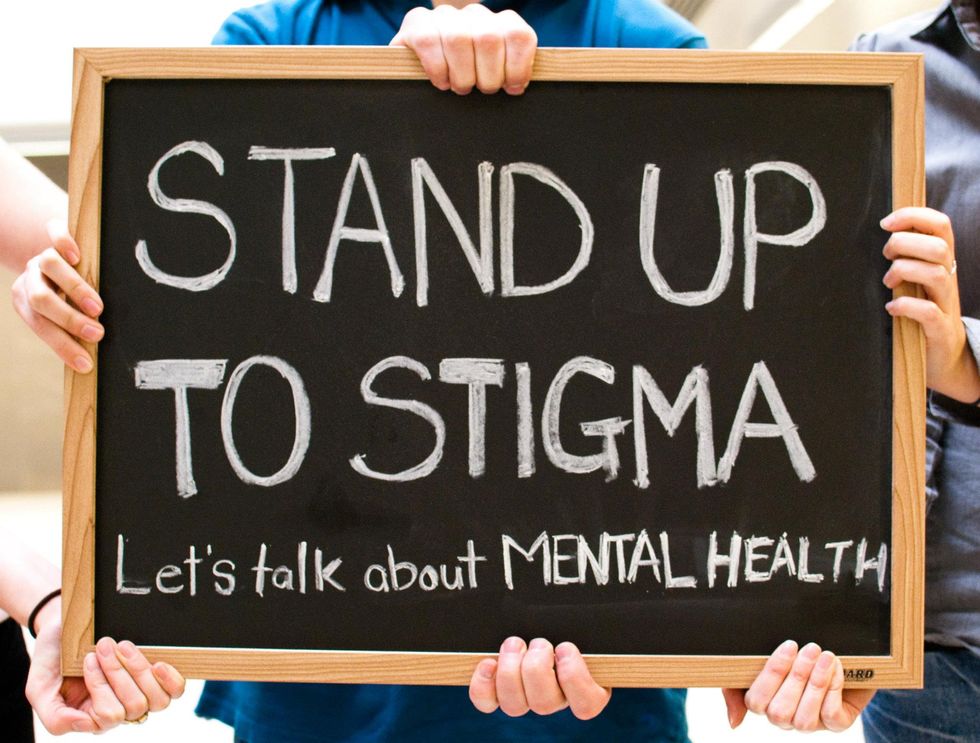Take a look around you. Look at someone who is in front of you, behind you, to the left and right of you. One of those individuals has been diagnosed with a mental illness. According to the National Alliance on Mental Illness (NAMI), 1 in 5 adults in the United States have a mental illness. The stigma surrounding mental illness is debilitating, fear-inducing, anxiety-producing, and downright awful. It is a devastating cycle; stigma is rooted in silence and that silence feeds the stigma. Stigma needs to end.
In honor of May being mental health awareness month, here are some ways you can contribute to ending the stigma surrounding mental health:
1. Take a pledge
You can help change the way the world views mental health. Because of stigma, people with mental illnesses are seen as "dangerous," "crazy," irresponsible and unstable. Those who suffer from a mental illness are less likely to be hired, and at times, are so afraid of rejection that they will opt out of pursing opportunities. Too often, people hold back from being open about the struggles in which they are dealing with due to the fact that they are uncomfortable and afraid of judgement. As a result, some individuals do not seek treatment or ask for help, which diminishes hope and chances of recovery. NAMI has created a Stigma-Free Pledge that you can take today. Through taking this pledge, you can play your part in reducing the stigma. Not only can you change the way you talk and think about mental illness, but you can encourage others to do the same. If you hear someone using stigmatizing language, correct them. Help those around you understand mental health and encourage them to take the pledge too. Through taking this pledge, you can do your part in reducing the stigma.
2. Educate yourself
Chances are you know someone who suffers from a mental illness. Whether it be a family member, a friend, a peer, teammate, a friend of a friend or even yourself, most of us know someone who is living with a mental illness. Education is arguably one of the most important things we can do for those who struggle with a mental illness. By learning about the specific illnesses people face, you may be able to understand more of what it is people go through on a day-to-day basis. Understanding different mental health conditions can allow you to better support the people you know who are facing these battles.
It is also important to educate yourself on the warning signs of various conditions. While it is unreasonable for anyone to know all of the warning signs for every given disorder, it can be helpful to familiarize yourself with some of the most common signs of mental illness in adolescents and adults. According to NAMI, suicide is the second leading cause of death for people ages 15-24. Suicide can be prevented. Take the time to learn about the signs and symptoms associated with mental illness.
3. Be an advocate
We have to have start the conversation about mental health. It takes vulnerability and courage to have these difficult conversations, but talking about mental illness is the only way to end the stigma. Sometimes, this might mean opening up and sharing about yourself. It can also mean creating a safe place for someone to come and share their story. When we come together and have these conversations-when we invest in the stories of other people-it gives us the power to make a difference in the lives of others.
Another way to be an advocate of mental health is to lead by example. This can take many different forms. If you struggle from a mental illness, seeking help and receiving treatment is leading by example. Engaging in self-care is another example. You can encourage others to lead by example through the use of person first language, and correcting those who do not speak correctly about mental illness.
You do not have to have a mental illness to support those who do! Everyone can help raise awareness about mental health. I have always been a mental health advocate, but it wasn't until recently that I was open about being a mental health advocate. I shared my story and experiences to help those who are still struggling to find their voice. By being a mental health advocate, it helps others know that they are loved, supported and not alone.
4. Practice empathy and compassion
Kindness is the most powerful, least costly, and most underrated agent of human transformation. It is simple and even cliché but cannot be said enough: be kind to one another. We are all facing our own demons, challenges and struggles. We are all fighting battles in which others may know nothing about. Be the reason someone smiles today, hold the door for someone and help others when you can. Give people the benefit of the doubt and practice forgiveness. All we want in life is to love and be loved. Each and every day, we get the opportunity to decide what kind of impact we will have on the lives and world around us—make it a good one. Sometimes, a selfless gesture or a moment of reassurance, even something as simple as a smile can be enough to save someone.
5. Listen
If you have been deemed trustworthy and safe by someone who is struggling, embrace it. It is not always easy to let others in. Sharing some of our deepest and darkest secrets with others is not easy. That being said, it is not always easy to take on all of that. It is okay to not know what to say or what to do. Listen; be present, and offer hope. You don't have to understand what they're going through, or know the perfect things to say or know exactly what to do. But you can listen. You can whisper words of hope and encouragement when they are drowning in the screams of darkness. You can take them for a drive, eat ice cream, be a shoulder to cry on, or just sit with them. It may not feel as though you are helping, but believe me, you are just by physically being there.
6. Get Involved
There are many ways that you can become involved either through volunteering, learning or donating. My favorite organization that has and continues to help me is called To Write Love on Her Arms (TWLOHA). This is a nonprofit organization, that helps those struggling with mental illness. You can become involved in a variety of ways. You can participate in events, read their blog and even join their team. You can also donate money, which helps fund education for communities and provides hope and encouragement. Additionally, through donations they are able to connect those with help who otherwise may not have the resources. To see how you can get involved with TWLOHA, click here.
You can be involved by furthering your education, so that you can help yourself, the people you know and others around you who may be struggling. You can take a mental health first aid course. This allows you to help someone who may be experiencing a mental health or substance abuse challenge. Another awesome organization is the Crisis Text Line. You can volunteer to become a trained specialist, to provide emotional support and safety planning to those in need.
Another way you can become involved is through volunteering with NAMI. There are many different events that you can participate in, help organize, and you can help fundraise or donate so that NAMI can provide help to more people.
This is not an extensive list-there are thousands of organizations out there who provide great help to those struggling with mental illness. One great place to start is your community. It can also be helpful to know what resources are available. There are crisis lines you can always call. There is always help available.
National Suicide Prevention Lifeline: 800-273-TALK
Crisis Text Line: 741-741
National Domestic Violence Hotline: 800-799-SAFE
National Sexual Assault Hotline: 800-656-HOPE
7. Share your story
If you or someone you know is living with a mental illness, encourage them to share their story. It took me years to find my voice, but I am so happy that I did. We are all just living stories that want to be heard, understood and validated. I decided to share my story because everyone deserves to know that their story is important, and their voice will be heard; there are people who will listen. People can read my story and know that they are not alone. You too can share your story. Everybody has different experiences, different perspectives, all of which add value to the lives of others. When you share your story, you let others know that it is okay to tell theirs.
Although May is mental health awareness month, the fight is not over at the end of the month. We will continue to raise awareness, educate, share our stories and pledge until stigma no longer exists. The fight against stigma is a battle we will win.






















